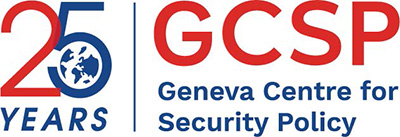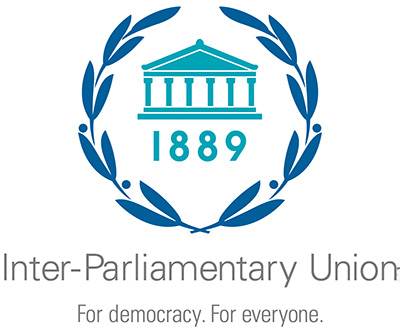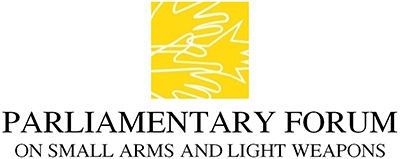Chapter overview:
- INTRODUCTION
- NUCLEAR RISK REDUCTION AND LOWERING THE ROLE OF NUCLEAR WEAPONS
- NON-PROLIFERATION, ARMS CONTROL AND PREVENTION OF A NUCLEAR ARMS RACE
- NUCLEAR TESTING
- NATIONAL PROHIBITIONS
- REGIONAL PROHIBITIONS THROUGH NUCLEAR-WEAPON-FREE ZONES
- ELIMINATION AND A NUCLEAR WEAPONS CONVENTION
- TREATY ON THE PROHIBITION OF NUCLEAR WEAPONS
Relevant international, regional and bi-lateral agreements:
- Treaty on the Non-Proliferation of Nuclear Weapons (NPT), 1968
- Treaties for establishing nuclear weapon-free zones in Africa (1996), Antarctica (1959), Central Asia (2006), Latin America and the Caribbean (1967), the Pacific (1985) and Southeast Asia (1995)
- Comprehensive Nuclear-Test-Ban Treaty (CTBT), 1996
- UN Security Council Resolution 2310 (supporting the CTBT), 2016
- International Convention for the Suppression of Acts of Nuclear Terrorism, 2005
- UN Security Council Resolutions 1540 (2004) and 2325 (2016)
- Strategic Arms Reduction Treaty (New START) between the United States and Russia, 2010
- Treaty on the Prohibition of Nuclear Weapons (TPNW), 2017
Recommendations:
Parliamentarians and parliaments can:
- Support the full ratification and entry into force of the Comprehensive Nuclear-Test-Ban Treaty;
- Ensure adequate assistance to victims and environmental remediation from nuclear tests;
- Support negotiations on a fissile materials treaty;
- Urge the nuclear-armed States to reduce the operational readiness to use nuclear weapons, and to make deeper, faster and irreversible cuts to all types of nuclear weapons;
- Work with governments to eliminate the role of nuclear weapons in security doctrines;
- Promote the establishment of additional nuclear-weapon-free zones, especially one in the Middle East;
- Work with their governments and civil society to strengthen the Nuclear Non-Proliferation Treaty (NPT) and ensure success of the NPT Review Conferences;
- Urge their governments to commence negotiations on a nuclear weapons convention or a similar package of agreements for the phased prohibition and elimination of nuclear weapons under strict and effective international control;
- Encourage governments, especially of non-nuclear States, to sign and ratify the Treaty on the Prohibition of Nuclear Weapons and adopt effective national implementation measures;
- Cooperate with civil society to build awareness about nuclear weapons risks and the need for nuclear disarmament, including through commemoration of the International Day against Nuclear Tests, the International Day for the Total Elimination of Nuclear Weapons and other relevant days;
- Examine national budgets to facilitate these goals.
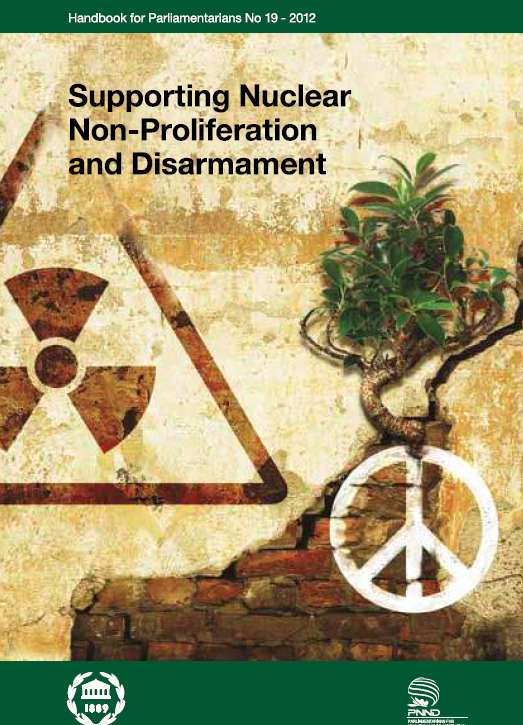
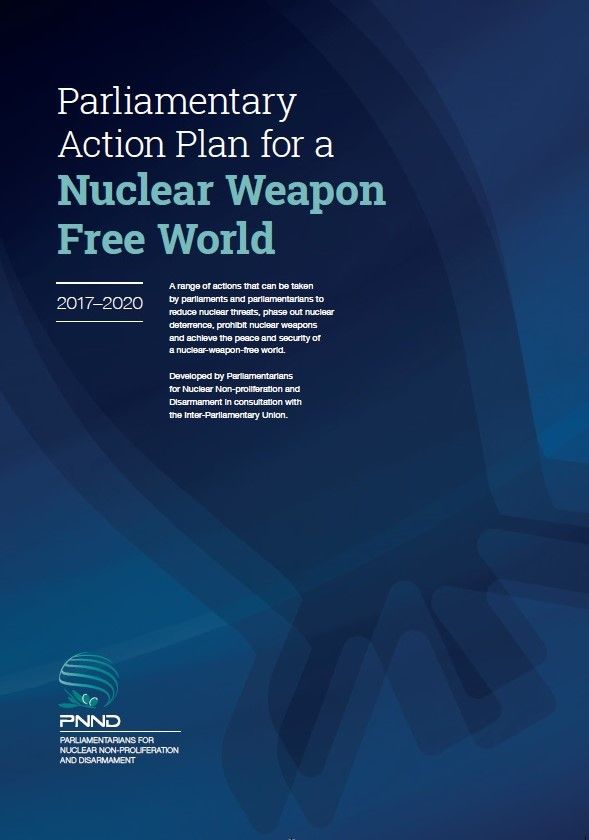
Note: These recommendations are drawn from disarmament resolutions adopted by consensus by the Inter-Parliamentary Union (179 member parliaments), declarations adopted by the OSCE Parliamentary Assembly (56 member parliaments) and recommendations in the Parliamentary Action Plan for a Nuclear Weapon Free World (2017) and the IPU/PNND Handbook for Parliamentarians on Supporting Nuclear Non-Proliferation and Disarmament (2012).
General Resources:
- Parliamentary Action Plan for a Nuclear Weapon Free World, published by PNND, 2017
- IPU Resolution: Towards a nuclear-weapon-free world: The contribution of parliaments, adopted by the 130th IPU Assembly, Geneva, March 2014
- Handbook for Parliamentarians: Supporting Nuclear Non-Proliferation and Disarmament, published by IPU and PNND, 2012
- IPU Resolution: Advancing nuclear non-proliferation and disarmament, and securing the entry into force of the Comprehensive Nuclear-Test-Ban Treaty: The role of parliaments, adopted by the 120th IPU Assembly: Addis-Ababa, April 2009
- World table: monitoring arms control and disarmament agreements, GCSP, IPU, SOAS & PNND
- UNODA database of disarmament treaties
Examples of good parliamentary practice:
NUCLEAR RISK REDUCTION AND LOWERING THE ROLE OF NUCLEAR WEAPONS
OSCE PA declaration on détente, diplomacy and no-first-use
The Parliamentary Assembly of the Organisation for Security and Cooperation in Europe (OSCE PA) adopts a declaration each year at its Annual Session in July. In 2018, the Assembly adopted the Berlin declaration which calls on nuclear-armed States and their allies to agree to no-first-use of nuclear weapons, adopt other disarmament and confidence-building measures, increase direct military-to-military contacts, and engage in structured dialogue to address the serious conflicts in the region. The declaration promotes mediation and dialogue as ‘cost-effective ways of preventing, managing and resolving violent conflicts,’ and highlights OSCE processes that are already helping to manage the conflicts, but need further political support for full success. The OSCE PA presented the declaration to the OSCE Ministerial Council, which includes the Foreign Ministers of all 57 OSCE member states (France, Russia, UK, US and all other NATO, European and former Soviet countries).
The increased threats of nuclear-weapons-use by accident, miscalculation or intent led the Bulletin of the Atomic Scientists earlier this year to move the hands of the Doomsday Clock this year to 2 Minutes to Midnight. Nuclear reliant governments must reverse these trends by taking all weapons systems off high alert, committing to never use nuclear weapons first, and commencing negotiations on the complete prohibition and elimination of nuclear weapons, as urged by the OSCE Parliamentary Assembly.
Margret Kiener Nellen MP, President of the Swiss delegation to the OSCE Parliamentary Assembly 2018-2019
No-first-use resolutions in US federal and state legislatures
In response to increasing conflicts between the nuclear-armed States since 2016, and threats by leaders (especially of the US, North Korea and Russia) to launch a nuclear attack, legislators in the United States have introduced resolutions calling for a US policy committed to never launching a nuclear war (no-first-use) and using diplomacy rather than nuclear threats to respond to and resolve these conflicts. Federal resolutions include the No-First-Use Act introduced into the Senate in January 2019 by Elizabeth Warren (S.272) and into the House of Representatives by Adam Smith (H.R.921), and the No Unconstitutional War with North Korea Act of 2020 introduced into the Senate by Ed Markey (S.4020) and in the House of Representatives by Ro Khanna (H.R.6639). It also includes resolutions in some State legislatures including, HR0061 introduced in the Illinois State Legislature by Representative Carol Ammons and adopted on May 15, 2019.
The passage of legislation like this is momentous and crucial because it demonstrates that the voices of US communities are not irrelevant or powerless on issues of national security, and it sets the US on a path away from nuclear war and towards multilateral disarmament and international peace.
US Representative Carol Ammons, Illinois State Legislature
US Senate hearing on the authority to launch a nuclear war
On November 14, 2017, the US Senate held a full committee hearing on the authority to order the use of nuclear weapons. This was the first such hearing in the US Senate since 1976. The hearing examined questions on the sole authority of the President to launch a nuclear attack, including the first use of nuclear weapons, whether there are any political and legal limits to this authority, and the chain of command in executing such an order. The hearings were held in response to the demand from Democratic and Republican senators to the Chair of the Senate Committee on Foreign Relations, arising from their concern about deteriorating relations between the US and other nuclear-armed States, in particular North Korea and Russia, that might prompt the US President to launch a nuclear attack.
Nuclear weapons are for deterrence, not war-fighting. Launching nuclear weapons first would be an unprecedented act of aggression. Any first-use of nuclear weapons would evolve into retaliatory strikes causing unimaginable death destruction and suffering. Absent a nuclear weapons attack on the US or our allies, no one human being should have the power to unilaterally unleash the most destructive forces ever devised by humankind. Yet, under existing (US) laws the President of the USA can start a nuclear war without provocation, without consultation and without warning. It boggles the rational mind.
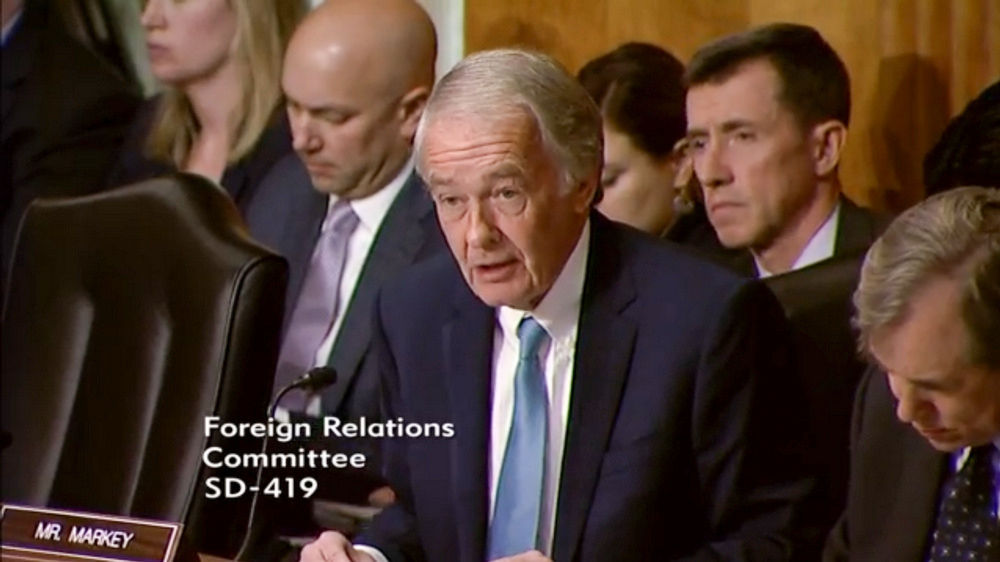
US Senator Ed Markey. Testimony to the US Senate Hearing on Authority to Order the Use of Nuclear Weapons, November 14, 2017. Photo: US Senate
Cooperative Threat Reduction Program
In 1991 the US Senate adopted the Soviet Nuclear Threat Reduction Act of 1991, co-authored by Senators Richard Lugar (Republican) and Sam Nunn (Democrat). The Act provides US technical and financial support for the storage, transportation, dismantling, and destruction of nuclear weapons and control of fissile material in former Soviet republics. It was established in order to prevent the seizure, theft, sale, or use of nuclear weapons or components following the break-up of the Soviet Union. The Cooperative Threat Reduction Program, facilitated by the Nunn-Lugar Act and implemented in cooperation with the Russian Federation and other former Soviet states, has been incredibly successful, leading to the dismantling, removal and/or elimination of nuclear weapons in Belarus, Kazakhstan and Ukraine, and the securing of nuclear weapons materials in Azerbaijan, Belarus, Georgia, Kazakhstan, Russia, Ukraine and Uzbekistan.
NON-PROLIFERATION, ARMS CONTROL AND PREVENTION OF A NUCLEAR ARMS RACE
UK 2019 House of Lords Inquiry on Rising nuclear risks, disarmament and the Nuclear Non-Proliferation Treaty
During February 2019, the UK House of Lords conducted an inquiry on the issue of Rising nuclear risks, disarmament and the Nuclear Non-Proliferation Treaty, which included deliberations, as well as hearings with disarmament experts and representatives of civil society organisations. The Select Committee on International Relations and Defence produced a report based on this inquiry which was released on April 24, 2019. A government response was published on July 4, 2019. This was followed by a debate in the House of Lords on July 16, 2019. The inquiry is a good example of a parliamentary process that engaged experts, civil society representatives and the government, as well as open debate in order to achieve a credible and useful outcome. Conclusions and recommendations of the Report included:
- The risk of the use of nuclear weapons has increased, in the context of rising inter-state competition, a more multipolar world, and the development of new capabilities and technologies.
- Nuclear possessor states should commit to the principle that a nuclear war cannot be won and must never be fought, and do all they can to reduce global tensions, support nuclear non-proliferation, and pursue nuclear disarmament
- While it’s understandable that the UK will remain opposed to the Treaty on the Prohibition of Nuclear Weapons, its proponents have legitimate concerns about the pace of disarmament and nuclear risk, and the Government should adopt a less aggressive tone towards it;
- The Government should make clear to the US Administration the value of the New Strategic Arms Reduction Treaty (New START) for Euro–Atlantic security, and advocate its extension.
- The Nuclear Non-Proliferation Treaty is at the core of the global non-proliferation and disarmament regime. As such the UK should be represented at the next NPT Review Conference at the highest relevant level (by the Secretary of State for Foreign and Commonwealth Affairs) and use this opportunity to increase transparency and dialogue between the nuclear-armed States and to take further measures to reduce the risk of nuclear use through misunderstanding and miscalculation.
This report may be from 2019, but it is even more topical and relevant now than then. The extension of New Start is essential if risks are not to grow even further. And the need for the nuclear powers to engage in a serious and detailed discussion of strategic stability is an urgent one.
Lord David Hannay, Member of the House of Lords Select Committee on International Relations and Defence
European Parliament Resolution on the 2020 NPT Review Conference
On February 19, 2020, the European Parliament adopted a Recommendation to the European Council and the EU High Representative for Foreign Affairs and Security Policy on Preparation of the 2020 Non-Proliferation of Nuclear Weapons Treaty (NPT) review process, nuclear arms control and nuclear disarmament options. The recommendation, amongst other things: called on States Parties to the NPT to reaffirm that a ‘nuclear war cannot be won and must never be fought’; called on Russia and the US to extend the new START Treaty and commence negotiations on an agreement on short and medium range nuclear missiles in light of the collapse of the INF Treaty; affirmed political and financial support for the process for establishing a Middle East nuclear-weapon-free zone; affirmed support for the Stockholm Initiative for incremental disarmament measures; reaffirmed the EU’s commitment to the Joint Comprehensive Plan of Action (JCPOA) as the best possible means for obtaining assurances of an exclusively peaceful use of nuclear energy by Iran; and called for entry-into-force of the CTBT.
Dialogue between Russian and US legislators on nuclear arms control
The Russian parliamentary group for relations with the US Congress was established to support dialogue between Russian and US legislators in order to increase understanding and improve relations. The group has organised a number of meetings and dialogues between Russian and US legislators on détente, arms control and non-proliferation. This has included formal events and informal meetings on the side of other events, such as OSCE Parliamentary Assemblies and academic conferences. Specific topics discussed have included the Iranian nuclear programme, denuclearisation of the Korean Peninsula, extension of the New START Treaty (New Strategic Arms Reduction Treaty), preservation of the Intermediate-Range Nuclear Forces Treaty (INF Treaty) and support for the Nuclear Non-Proliferation Treaty.
Our positions diverge on many topics, but we still unite if the understanding of the need for an inter-parliamentary dialogue.
Inga Yumasheva, Coordinator, Russian parliamentary group for relations with the US Congress
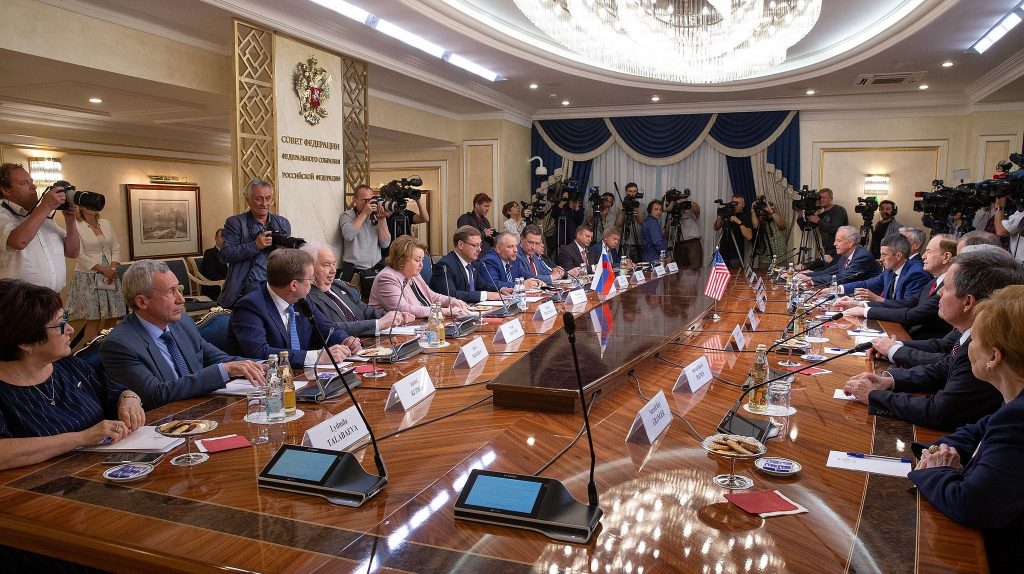
US HALT Act 2020
On June 18, 2020, US Senator Ed Markey, member of the Senate Foreign Relations Committee, and member of the US House of Representatives James McGovern, House Rules Committee Chairman, introduced the bicameral Hastening Arms Limitation Talks (HALT) Act 2020 (S.4045). The Act aims to freeze the global development and deployment of nuclear weapons, and uphold the Cold War-ending creed that ‘a nuclear war cannot be won and must never be fought’. In particular, the Act supports a renewal of the START agreement between Russia and the US, ratification by the US of the Comprehensive Nuclear-Test-Ban Treaty, conclusion of a fissile material control treaty, and negotiations with other nuclear-armed States to achieve universal no-first-use policies, and a verifiable freeze on the testing, production, and deployment of all nuclear weapons and their delivery vehicles. The act also calls on the US government to initiate a series of Summits on Nuclear Disarmament similar to the very successful Nuclear Security Summits initiated by US President Obama in 2010 and which ran until 2016.
This is not an academic debate – our world has come perilously close to a catastrophic nuclear war before, and such an event is becoming more and more likely by the day. It’s time to hit the brakes on his dangerous escalation, honor our existing treaty obligations, and then put an end to nuclear weapons before they put an end to us.
James McGovern, Sponsor of the HALT Act 2020 in the US House of Representatives
NUCLEAR TESTING
The PTBT Amendment Conference – a novel approach to achieve the CTBT
In 1963, the UK, US and USSR negotiated a Partial Test Ban Treaty (PTBT), which prohibits atmospheric testing and which affirms an obligation of States Parties to seek ‘to achieve the discontinuance of all test explosions of nuclear weapons for all time’ and to ‘continue negotiations to this end.’ Despite a series of UN General Assembly resolutions supporting negotiations for a Comprehensive Nuclear-Test-Ban Treaty (CTBT), by 1990 these negotiations had not commenced due to resistance by some of the nuclear-armed States. Parliamentarians for Global Action launched an initiative to amend the PTBT to turn it into a Comprehensive Test Ban Treaty. Under the terms of the PTBT, the UK, US and Russia were required to host a PTBT Amendment Conference, once this was formally requested by one-third of the PTBT States Parties. The PTBT Amendment Conference, held 1991, helped shift the political ground to enable the Conference on Disarmament in Geneva to commence in 1993 the successful negotiations on a CTBT.
Advancing CTBT Entry into Force, French National Assembly
The French National Assembly established a working group on the Entry into force of the Comprehensive Nuclear Test Ban Treaty (CTBT) in 2019 following a parliamentary study on the NPT, led by Members of Parliament Michel Fanget and Jean-Paul Lecoq. The working group considered concrete action points to be adopted by parliamentarians to advance with the treaty’s entry into force. The initiative has been recognised by the Comprehensive Nuclear-Test-Ban Treaty Organization (CTBTO) which has offered support through documentation, advice and legal assistance.
Parliamentary visits to the CTBTO
The CTBTO Headquarters in Vienna welcomes visits of parliamentary delegations so that parliamentarians can see first-hand the technical and operational means of the organisation to verify the ban on nuclear tests, and provide other useful data to member states on seismic and radiological events. Verification is an important issue for states that are considering ratification of the CTBT. Following a visit to the CTBTO by a parliamentary delegation from Indonesia in May 2011, the Indonesian parliament was then able to ratify the treaty in February 2012, the most recent Annex II state to ratify. In addition, developing an understanding of the added value of the CTBTO’s global monitoring system for such things as tsunami early warning and monitoring radiation dispersal from nuclear accidents (such as Fukushima), helps parliamentarians from member states ensure adequate support for the CTBTO to undertake its work.
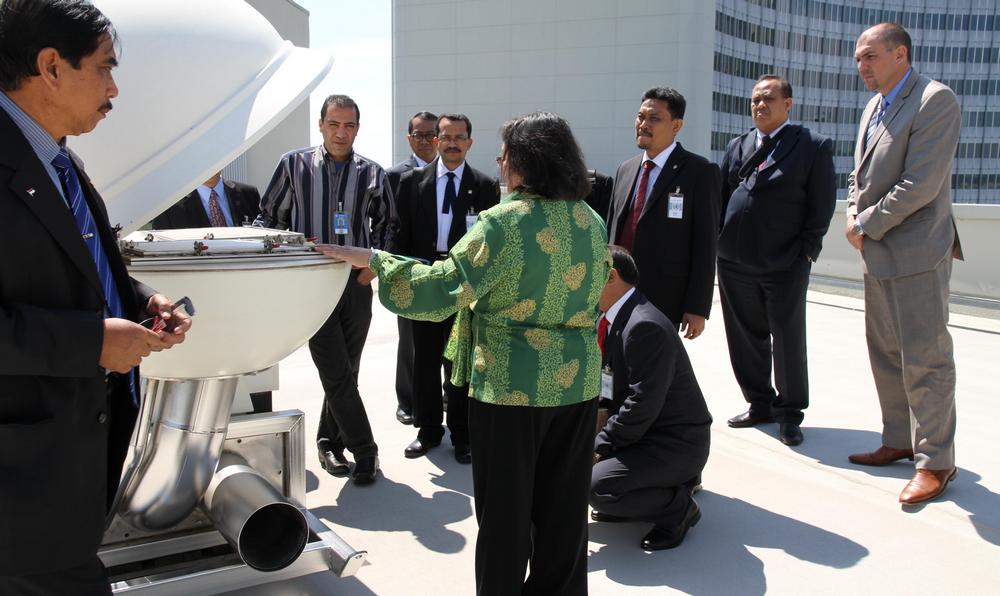
Cutting the funding for nuclear testing – the PLANET Act
In June 2020, US Senator Ed Markey announced introduction of the Preserving Leadership Against Nuclear Explosives Testing (PLANET) Act, to prevent the US government from restarting explosive nuclear weapons testing by prohibiting congressional funding for such a purpose. The move was in response to reports that US officials proposed a resumption of nuclear testing, and in particular considered a demonstration nuclear test, in what Markey said would be a misguided and counter-productive effort to bring Russia and China to the negotiating table for arms control talks.
A demonstration nuclear weapons test blast would be a massive mistake that would set back US and global security for decades to come. It would break the de facto global nuclear test moratorium, likely trigger nuclear testing by other states, and set off a new nuclear arms race in which everyone would come out a loser. Congress cannot afford to be silent and must step in by enacting Sen. Ed Markey’s important initiative to put in place a legal prohibition on the use of funds to resume nuclear weapons testing. For the sake of our generation and generations to come, it is time to act to avoid a pandemic of dangerous nuclear weapons testing and proliferation.
Daryl G. Kimball, Executive Director, Arms Control Association
US Nuclear testing compensation legislation
Since the 1960s, the US Congress has been active on the issue of compensation to personnel impacted by atmospheric nuclear testing. This has included the adoption of legislation on compensation relating to nuclear tests in the US such as the Radiation Exposure Compensation Act of 1979, sponsored by Senator Ted Kennedy, and legislation relating to US nuclear tests in the Marshall Islands, such as the Nuclear Claims Tribunal Act of 1987 and the Compact of Free Association Act (provision 117). Although these have provided compensation for many of the people whose health has been impacted, the funding made available for the Marshall Islands has been considerably less than what was determined by the Nuclear Claims Tribunal to be required. And there are some members of Congress who believe that the compensation for US personnel affected is also inadequate. As such, there have been a number of (mostly unsuccessful) attempts in Congress to increase the compensation, including most recently the Republic of the Marshall Islands Supplemental Nuclear Compensation Act of 2011 and the Mark Takai Atomic Veterans Healthcare Parity Act of 2019.
Environmental monitoring and the Runit Island nuclear dome
In June 2019, Member of the US Congress Tulsi Gabbard successfully included an amendment in the 2020 National Defense Authorization Act, which required the government to undertake a scientific review of the nuclear waste storage facility on Runit Island in the Marshall Islands. The facility, locally called The Tomb, contains over 100,000 cubic metres of radioactive nuclear waste created by US nuclear testing during the Cold War. Ms Gabbard moved for the review due to concerns that the concrete structure containing the waste is deteriorating and could be vulnerable to sea-level rise caused by climate change.
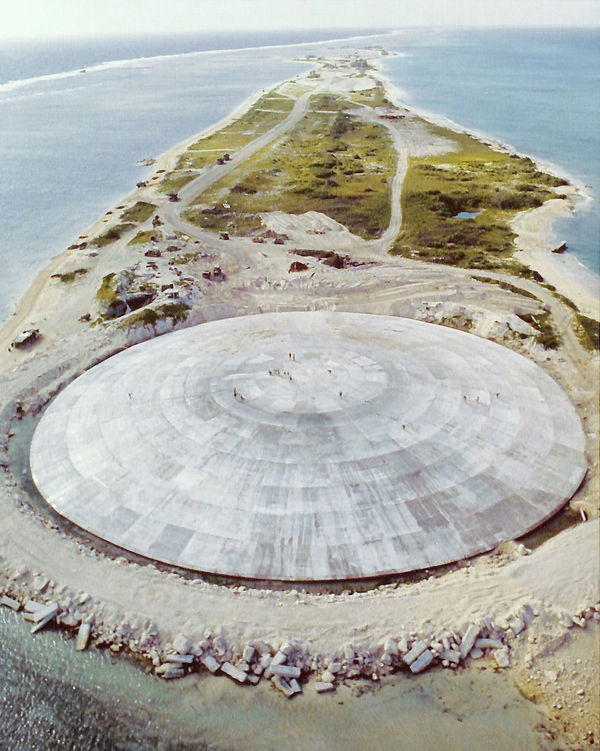
Resources:
- Prohibiting and Preventing Nuclear Explosions: Background Information for Parliamentarians on the Comprehensive Nuclear-Test-Ban Treaty, by the CTBTO in English, Arabic, French, Spanish
- CTBTO legal resources, including a Guide to CTBT National Implementation Measures, CTBT Legislation Database, text of the CTBT, Model Facility Agreement and other documents.
NATIONAL PROHIBITIONS
Parliaments can adopt national legislation to comprehensively prohibit the use, threat of use, testing, development, production, transfer and possession of nuclear weapons within their territory and other areas of jurisdiction. The parliaments of Austria, Mongolia, Philippines and New Zealand have all adopted legislation along these lines. The adoption of the Treaty on the Prohibition of Nuclear Weapons is expected to result in additional national legislation in some of those countries ratifying the treaty in order to fully implement the Treaty (see below).
The New Zealand Nuclear Free Zone Act
In June 1987, the New Zealand parliament adopted the Nuclear Free Zone, Arms Control and Disarmament Act, which is the most comprehensive nuclear prohibition legislation adopted by a national legislature. The act prohibits manufacture, acquisition, possession or control over nuclear weapons, as well as aiding or abetting any person in these acts within the territorial space (land, sea and air) of New Zealand. It also contains an extra-territoriality clause prohibiting such acts by agents of New Zealand (government officials or civil servants) anywhere in the world. The act also established a cabinet position of Minister for Disarmament and Arms Control and a Public Advisory Committee on Disarmament and Arms Control tasked to advise the government on implementation of the act and to disperse public funds for peace and disarmament education.
REGIONAL PROHIBITIONS THROUGH NUCLEAR-WEAPON-FREE ZONES
Over 110 countries, including virtually all of the countries in the Southern Hemisphere, are members of regional Nuclear-Weapon-Free Zone (NWFZ) treaties, which prohibit the possession of nuclear weapons by States Parties or the stationing of nuclear weapons on their territories. The NWFZ treaties also include protocols through which the nuclear-armed States commit to respecting the zones and to not threatening or using nuclear weapons against States Parties to the zones. The United Nations Institute for Disarmament Research (UNIDIR) has highlighted the ways in which these provisions help build regional peace and stability. Additional NWFZs have been proposed for the Middle East, North-East Asia the Arctic and Europe.
The proposal for a Middle East zone free from nuclear weapons and other weapons of mass destruction has received strong support from NPT Review Conferences in 1995, 2000 and 2010. In 2010, the States Parties to the NPT called on the UN to host a conference on establishing such a zone, with the participation of all countries in the region, plus the three depositories of the NPT (Russia, UK and US). However, it was not possible to hold the conference, due to lack of agreement on the conference modalities by at least two of the required parties. More recently the UN General Assembly decided to hold a Conference on establishing a Middle East WMD Free Zone without requiring participation by all states in the region. The first session of the conference was held in November 2019. Parliamentarians can promote the existing zones, including their full acceptance by the nuclear-armed States, and they can support the establishment of additional zones.
Treaty of Tlatelolco receives Future Policy Award
In 1968 the adoption of the Treaty of Tlatelolco established the first Nuclear-Weapon-Free Zone (NWFZ) in an inhabited region, covering Latin-America and the Caribbean. The Treaty has served as an inspiration and model for the adoption of additional NWFZs in the South Pacific, South East Asia, Africa, Central Asia and Mongolia. In 2013, the Organization for the Prohibition of Nuclear Weapons in Latin America and the Caribbean (OPANAL), which is the agency established to implement the Treaty of Tlatelolco, was awarded the Future Policy Award’s Gold Medal for Disarmament to honour the invaluable contribution made by the Treaty and OPANAL to advancing peace and security in the region and globally.
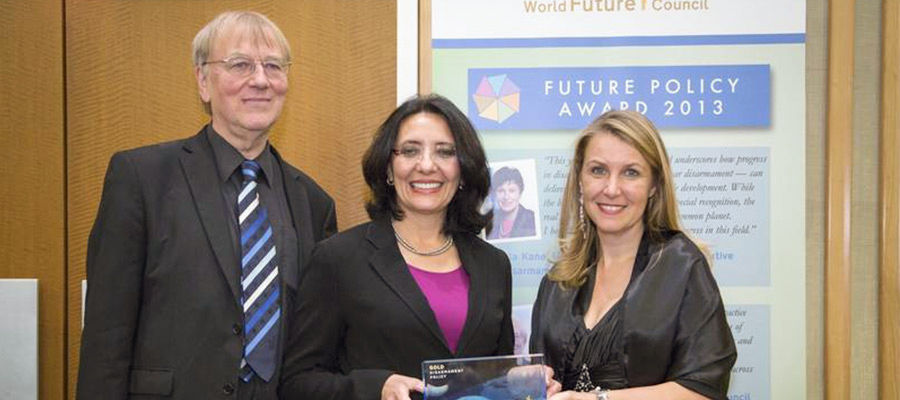
Joint Parliamentary statement supporting a Middle East WMD Free zone
In October 2011, Parliamentarians for Nuclear Non-proliferation and Disarmament released a Joint parliamentary statement supporting a UN conference on establishing a Middle East Zone free from Nuclear Weapons and other WMD. The statement was endorsed by parliamentarians from countries within the region (Bahrain, Egypt, Israel, Jordan, Lebanon, Morocco and Palestine) as well as from parliamentarians from the three depository countries (Russia, UK and US) and other key parliamentarians (e.g. Federica Mogherini who was Secretary of the Italian Parliament Defence Committee and later became the EU High Representative for Foreign Affairs and Security Policy).
Bahrain IPU Parliamentary Group support for a Middle East WMD Free Zone
The Bahrain Parliamentary Group (Bahrain Delegation to the Inter-Parliamentary Union and Asian Parliamentary Assembly) has been active in the deliberations and adoption of IPU resolutions on peace, disarmament and international security, and in the implementation of these. In a statement prepared for this handbook in August 2020, the Parliamentary group affirmed its commitment to the achievement of a Middle East Zone free from nuclear weapons and other weapons of mass destruction (in accordance with UN General Assembly Decision 73/546 based on the resolution of the 1995 Non-Proliferation Treaty Review Conference), and gave support to nuclear non-proliferation agreements (NPT and CTBTO) plus political initiatives that could contribute to this goal. The statement also gave support to the UN Secretary-General’s initiative for a global ceasefire.
North-East Asia NWFZ
Parliamentarians from across the political spectrum in Japan and South Korea have supported a North-East Asia NWFZ based on the 3+3 proposal (North Korea, South Korea and Japan relinquishing nuclear weapons and extended nuclear deterrence, with China, Russia and the US giving security assurances not to deploy or use nuclear weapons in region of the zone). This has included events on the proposal held in the Japanese and South Korean parliaments and a Joint statement of Japanese and South Korean parliamentarians on Denuclearisation of Northeast Asia which supports a North-East Asia NWFZ and was endorsed by 93 parliamentarians, including some who have held the positions of Foreign Minister or Defence Minister.
We recognize the importance of solidarity and cooperation between Japan and the ROK in achieving the denuclearization of Northeast Asia, in which Japan, the ROK and the DPRK commit themselves not to possessing nuclear weapons, and the neighbour countries possessing nuclear weapons commit not to using or threatening to use such weapons against Japan the ROK and the DPRK, while striving for their own nuclear disarmament. Especially, we call on the Governments of Japan and the ROK to advocate the establishment of a Northeast Asia Nuclear Weapon-free Zone in the international fora, including the NPT Review Conference and the U.N. General Assembly.
Excerpt from the Joint statement of Japanese and Korean parliamentarians for Denuclearisation of Northeast Asia, May 2010
Resources:
- Pathways Forward for the ME WMDFZ Process and 2020 NPT Review Conference, Chen Zak Kane, UNIDIR, April 2020
- Draft Treaty for a Weapons of Mass Destruction Free Zone in the Middle East, prepared by the METO Project, 2019
- UN Study on effective and verifiable measures which would facilitate the establishment of a nuclear-weapon-free zone in the Middle East, 1990
- Model treaty for a NE Asia Nuclear Weapon-Free Zone, prepared by the Democratic Party of Japan Nuclear Disarmament Group
- A NE Asia Nuclear Weapon Free Zone with a Three-plus-Three Arrangement, by Hiromichi Umebayashi, The Nautilus Institute
- A Nuclear Weapon-Free Zone in Europe: Concept – Problems – Chances, Peace Research Institute Frankfurt, January 2016
ELIMINATION AND A NUCLEAR WEAPONS CONVENTION
A Nuclear Weapons Convention (NWC) would be a global treaty, involving nuclear-armed States and their allies, as well as non-nuclear States. It would prohibit nuclear weapons and provide an agreed programme for their phased elimination under strict and effective international verification, implementation and enforcement. The UN General Assembly has proposed negotiations on such an agreement, supported by over 130 countries, including some of states possessing nuclear weapons. A NWC has been promoted by successive Secretary-Generals of the United Nations as well as the Inter-Parliamentary Union in its resolution adopted in 2014, Towards a Nuclear-Weapon-Free World: The Role of Parliaments.
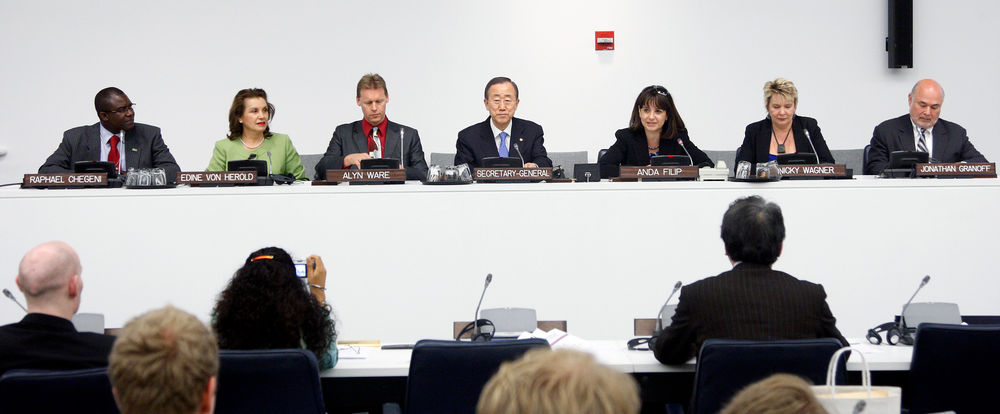
Parliamentary resolutions supporting the NPT and a Nuclear Weapons Convention
In the run-up to the 2010 Nuclear Non-Proliferation Treaty (NPT) Review Conference, a number of parliaments adopted resolutions supporting a Nuclear Weapons Convention, with many of them calling for action on this at the NPT Review Conference. This included the parliaments of Australia, Austria, Bangladesh, Canada, Costa Rica, Germany, Italy, Mexico and New Zealand, as well as the European Parliament. Similar resolutions were also introduced into the legislatures of France, the UK and the US, but were not adopted. These resolutions were presented to the UN Secretary-General and to the States Parties participating in the 2010 NPT Review Conference. The result was the inclusion of a specific affirmation in the NPT Review Conference final document (adopted by consensus) of the need to achieve a nuclear-weapon-free world, and noting in this regard the proposal for a nuclear weapons convention.
IPU Resolution on nuclear disarmament and the role of parliaments
On March 20, 2014, at its 130th Assembly, the Inter-Parliamentary Union adopted by consensus a resolution entitled Towards a Nuclear-Weapon-Free World: The Role of Parliaments. Amongst other things, the resolution calls on member parliaments to work with their governments to ‘eliminate the role of nuclear weapons in security doctrines and policies’, and to ‘support negotiations on a nuclear weapons convention or on a package of agreements to help achieve a nuclear-weapon-free world, as outlined in the United Nations Secretary-General’s five point proposal and noted in the 2010 NPT Review Conference Action Plan.’
Resources:
- Model Nuclear Weapons Convention, United Nations Document A/62/650, 2007
- Securing our Survival: The Case for a Nuclear Weapons Convention, IPPNW, IALANA, INESAP, 2007
- Global Zero plan for the elimination of nuclear weapons
TREATY ON THE PROHIBITION OF NUCLEAR WEAPONS
The Treaty on the Prohibition of Nuclear Weapons (TPNW) is an agreement negotiated by non-nuclear States to prohibit nuclear weapons. Once it enters into force in January 2021 it will apply to all States who have ratified the treaty. Parliamentarians in non-nuclear States can encourage their governments to sign. Once the treaty is signed, parliamentarians can adopt legislation for its ratification and national implementation.
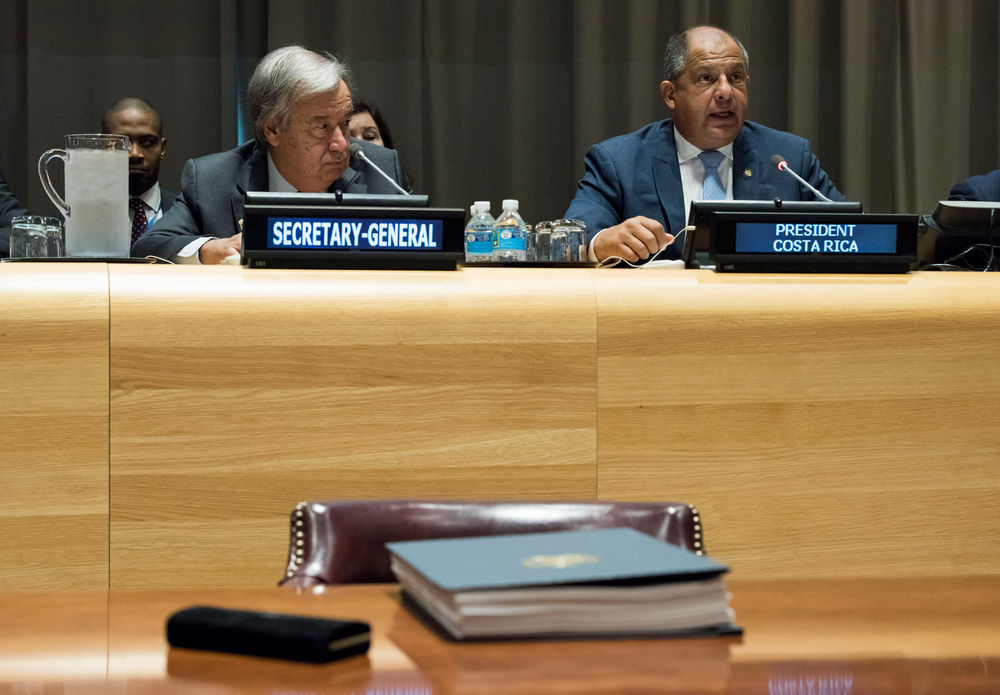
IPU/ICAN letter to parliaments
On August 6, 2020, in conjunction with the 75th anniversary of the first use of nuclear weapons, the Inter-Parliamentary Union and the non-governmental organisation ICAN sent a joint letter to Speakers of Parliaments which had not signed the TPNW. This included all the nuclear-armed States and their allies and a number of non-nuclear States. The letter requested the speakers to ‘raise awareness of the treaty among the members of your Parliament and to help generate a constructive debate on nuclear weapons, proliferation risks and disarmament.’
Bangladesh draft TPNW implementation legislation
In follow-up to the ratification of the TPNW by the Bangladesh parliament, Saber Chowdhury MP drafted implementation legislation modelled on New Zealand’s 1987 law prohibiting nuclear weapons and Mongolia’s 2000 law establishing Mongolia as a single-state nuclear weapon-free zone. The draft legislation also includes some additional elements such as liability for nuclear weapons detonations by other countries that might impact on the sovereignty of Bangladesh and health and security of its people. The draft legislation is pending action as of October 2020.
Resources:
- Treaty on the Prohibition of Nuclear Weapons, Questions and Answers, UNFOLD ZERO, 2020.
- Parliamentary Action Plan for a Nuclear Weapon-Free World, chapter on the TPNW, page 7.

